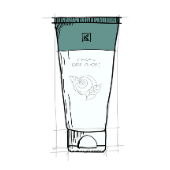
How to find the perfect plant oil to revitalize your skin?
17 September 2024Sometimes it seems that your skin is impossible to control, especially the morning anguish in front of the mirror of discovering new pimples, and that’s what makes us wonder: who’s to blame for the appearance of this acne? And above all, how do you get rid of them?
1. Knowing your enemy is half the battle!
A pimple begins to appear when the skin’s pores become clogged with a type of grease called sebum, which normally lubricates the skin and hair. Acne is common during puberty, when hormones get out of control, causing the skin to produce excess sebum. As many sebum-producing glands are found on the forehead, nose and chin, it’s in this area – the T-zone – that most pimples appear.
2. Want to get rid of those nasty little acne spots? We’ve got all the solutions!
- Wash your face twice a day (no more) with lukewarm water and a mild soap specially designed for acne sufferers. Gently massage your face in circular motions. And don’t rub your face!
- Don’t pop the buttons. It’s tempting, but here’s why you shouldn’t: when a pimple bursts, it can push infected material into deeper layers of your skin, causing more inflammation and redness and even wounds, which can leave small permanent scars.
- Avoid touching your face with your hands or leaning on objects that tend to collect sebum and skin debris, such as the telephone handset. Touching your face can spread bacteria that cause inflammation and irritation of the pores. To prevent the spread of bacteria, wash your hands thoroughly before applying any products to your face, such as skin creams or make-up.
- If you wear prescription glasses and/or sunglasses, be sure to clean them often to prevent oil from clogging the pores around your eyes and nose.
- Remove your make-up before going to bed at night. When buying make-up, choose products whose labels or packaging state“non-comedogenic” or“non-acnegenic“. Throw away old make-up that smells or looks different.
- Keep your hair clean and avoid contact with your face, so that sebum and dirt don’t further clog your skin pores.
- Protect your skin from the sun. A tan may seem to cover acne, but it’s only temporary. A tan can make your acne worse, not better. The sun also causes skin lesions that eventually lead to wrinkles and increase the risk of skin cancer.
- Never use alcohol, antiseptics or soaps, which destroy the skin’s flora, or microbiome, and dry out the skin by raising its pH unnecessarily.
- Micellar waters for acne-prone skin have the advantage of being both effective and quick to use. A simple swipe of cotton is usually all that’s needed.

The classic cleansing milk + toner duo can also help reduce the appearance of acne on your skin. We recommend using ANTI-ACNE TONIC with 54% rose water by KARAMAT COSMETICS, perfectly suited to acne-prone skin. It helps purify the skin and prevent the formation of acne pimples thanks to its active ingredients.

- Apply a purifying mask once or three times a week to absorb the excess sebum responsible for shine, unclog pores and eliminate blackheads. Try THE BLACK PEEL-OFF MASK by KARAMAT COSMETICS with ECOCERT CERTIFIED NORWEGIAN ALGAE, it nourishes and restores a visibly smoother, matte appearance to your skin, thanks to the vitamin B3 it contains.
Be patient and persevering with your skin routine, you’ll surely notice an improvement. And for those suffering from more severe acne with inflammation, it’s best to consult a dermatologist. He or she will certainly be able to prescribe a more appropriate treatment.





